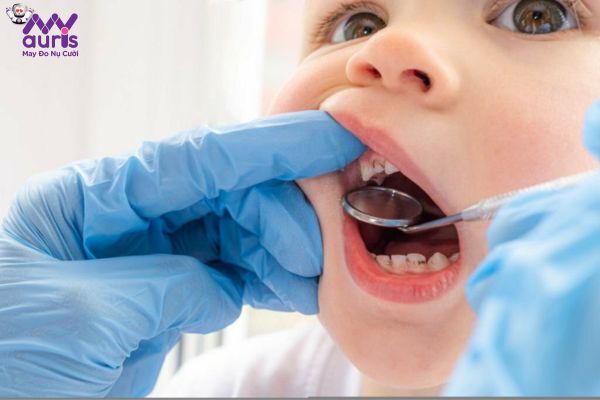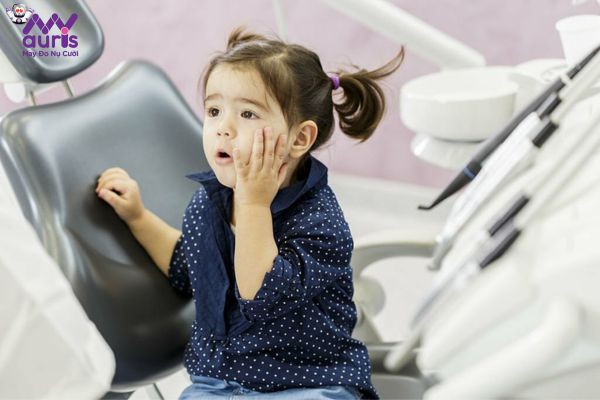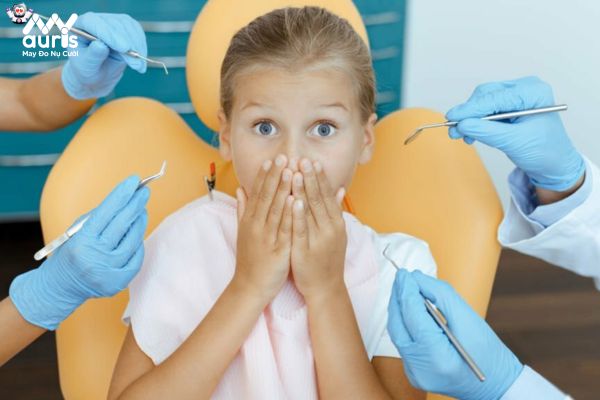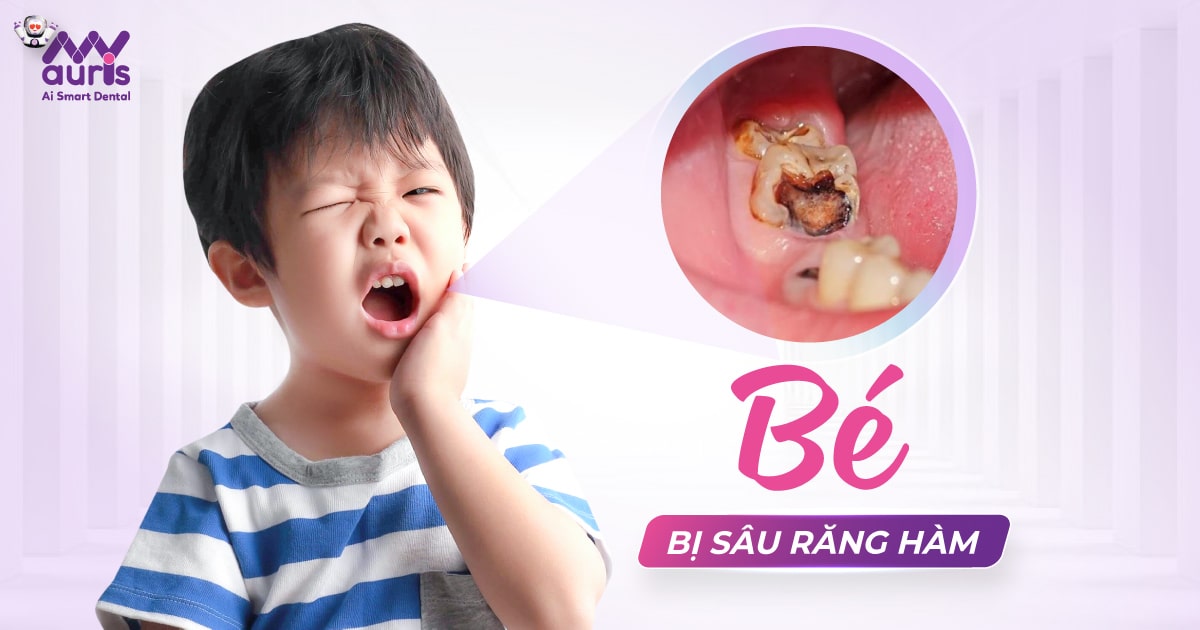Tooth decay is a fairly common condition in children. This not only affects the aesthetics of the molars but also causes children to often feel pain, affecting their chewing and daily hygiene. If parents are worried about their baby’s molar tooth decay, the information in this article – My Auris Dental will help you get the most accurate answer.
The common causes of molar tooth decay in babies today now
Understanding the causes of molar tooth decay in children will help parents control the condition. At the same time, enhance the ability to effectively prevent and treat tooth decay.

The baby’s daily oral hygiene process is not correct way
For the most part, parents tend to overlook guiding their children in the process of oral hygiene and health care. They consider that baby teeth will replace new ones after the baby grows up. However, this point is a misconception – Contributing to many cases of tooth decay in children, especially in molars.
Children from 5 years old can eat the same diet as adults, they eat a lot and do not follow the correct oral hygiene routine. This leads to the accumulation of plaque on the teeth, creating more favorable conditions for bacteria to grow, causing harmful effects to the teeth.
Children’s health status
There are some children who have molar tooth decay due to general health problems. There will be some specific health-related causes that cause tooth decay in children:
- Allergy (chronic): Some children with chronic allergies will often have molar tooth decay. This allergic condition can reduce saliva secretion, creating a favorable environment for bacteria that cause tooth decay.
- Mouth breathing: Babies who regularly breathe through their mouths are at higher risk of tooth decay. Breathing through your mouth will reduce the amount of saliva in the oral cavity, making the mouth drier, creating favorable conditions for bacteria that cause tooth decay to grow.
- Lack of nutrients: Iron, calcium,… deficiency will lead to a high risk of diseases.baby has tooth decay. These nutrients are very important for development and the ability to maintain oral health.
Children with Fluoride deficiency
Fluoride is a natural mineral with the effect of protecting and regenerating tooth tissue in the initial stages. There is often a lot of Fluoride in water and foods. Besides, toothpaste also has Fluoride to enhance oral health and prevent tooth decay.
Unscientific daily eating habits

Babies tend to like sweet foods, but foods high in sugar and starch are not good for dental health. Sugar and colorants in foods will stick to teeth, causing tooth enamel erosion and creating a favorable environment for bacteria to attack teeth.
Furthermore, after eating sweets such as cakes, candies, carbonated soft drinks,… without rinsing the mouth or drinking water to clean them, there is a high chance of tooth decay.
Signs to help identify baby’s tooth decay
To best solve the problem of baby’s molar tooth decay, parents also need to understand the exact signs their baby is experiencing. According to My Auris experts, tooth decay in children will develop in different stages, with the following symptoms:

- Light level tooth decay: The tooth decay stage does not have obvious cavities, but the most common symptom is a change in tooth color. Specifically, white spots may appear on the tooth surface due to bacteria attacking the tooth enamel. However, it will be quite difficult to recognize, so parents should have their children periodically examined by a doctor for the best treatment.
- Moderate tooth decay: A stage accompanied by tooth wear, manifested by brown-black cavities on the tooth surface. Children with tooth decay may experience painpain at many attack locations, causing difficulty in chewing and making the baby not want to eat anymore.
- Severe tooth decay: When tooth decay has progressed to this stage, children will experience extremely strong pain, the number of pain will also increase, and the pain will be continuous. If bacteria penetrate the tooth pulp tissue, the child will experience pain that causes pain to the brain.
What should a child with tooth decay do in treatment?
Milk teeth play an important role in chewing and supporting your baby’s pronunciation. Doctors always aim to maintain the health and beauty of teeth. For children, it will be necessary to make maximum efforts to preserve baby teeth so that when teeth are replaced, they will have more beautiful permanent teeth that are not crooked. Therefore, children with molar tooth decay will have the following treatment directions:

Do not treat need tooth extraction
Instead of tooth extraction, you can let your baby apply some of the following methods for babies with baby teeth:
- Examination and treatment at children’s dental centers: When detecting symptoms such as sensitivity, pain, etc., parents should take their children for examination at dental centers to get support from doctors to check and suggest the best treatment. During this process, the doctor also considers whether or not the baby’s teeth should be extracted.
- Remineralization for cavities: For new cases of tooth decay, tooth remineralization will help completely restore children without causing pain. The doctor will use materials such as: Calcium, fluoride, phosphate,… to cover the cavity. From there, it helps regenerate tooth enamel as well as prevent the growth of harmful bacteria.
- Tooth filling: In more severe cases of tooth decay, parents should perform a root canal, then fill the cavity to eliminate infection and bacterial attack.
In cases where baby teeth should be extracted
Early extraction of baby teeth can affect oral health For children, it can typically slow down the jaw bone development process, causing a narrow jaw or lack of room for teeth to grow.
Therefore, for children with molar decay, experts recommendYou should limit tooth extraction except in certain mandatory situations:
- Carious teeth are infected with tooth roots, causing the risk of tooth enamel deficiency and abscesses on the tooth socket.
- A decayed tooth has shown signs of complete pulp death, leading to the risk of severe infection spreading to the permanent tooth germ below.
- Severe tooth decay, has been treated many times but there is no improvement. In this case, the doctor considers extracting the tooth to prevent the infection from gradually spreading to other baby teeth.
Hopefully this information can help you better understand the condition of your baby with molar tooth decay (in cases where baby teeth are still present). Regular check-ups will be an effective way to help your child prevent tooth decay and limit unwanted complications in the future. My Auris is a reputable dental facility that you can refer to and take your child to see a specialist doctor, the process will be supported by advanced machines. Therefore, good support for the treatment process, maximum preservation of teeth for children to limit tooth extraction.
Yen Nhi





